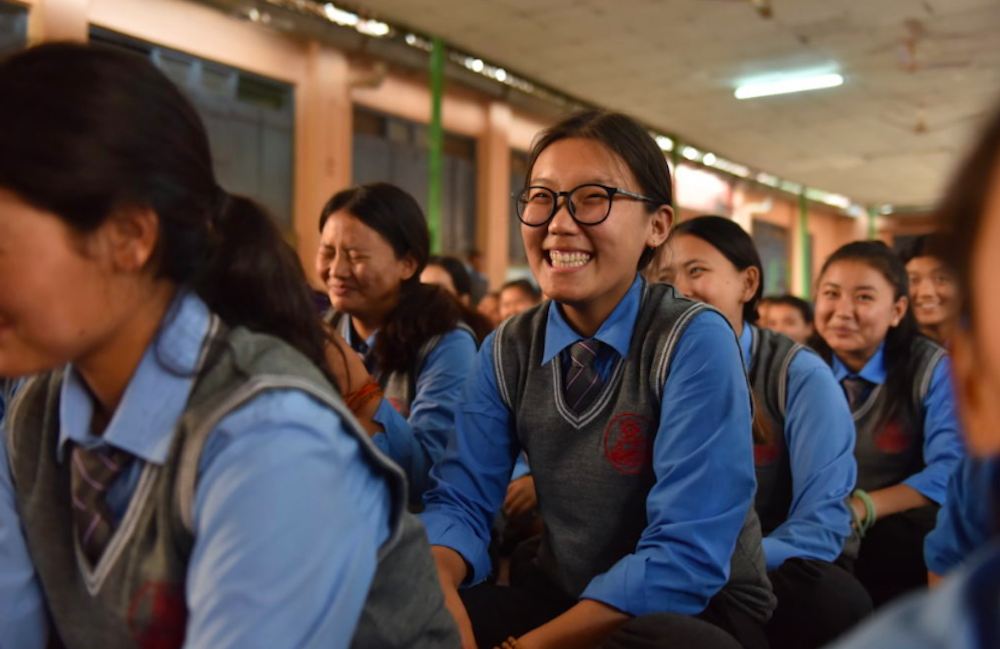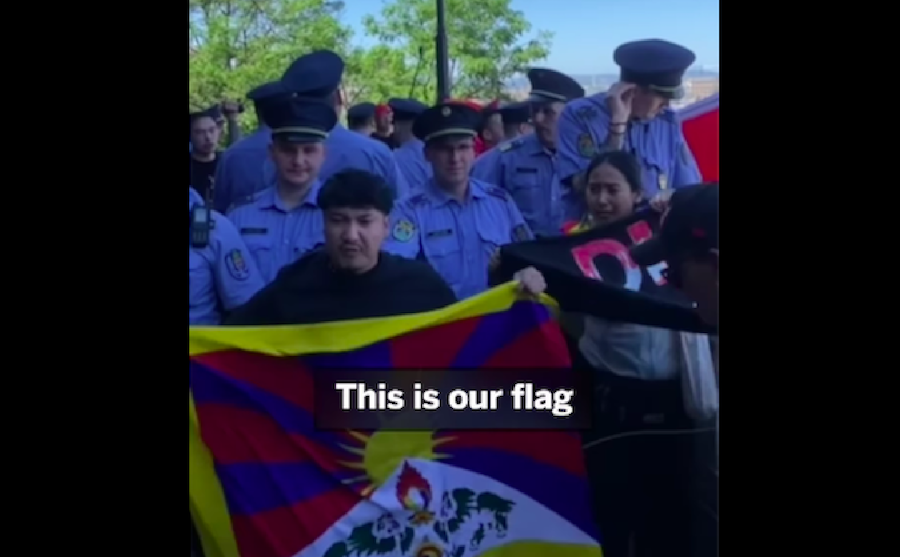Message from Kashag
10 March 2003
Today, as we commemorate the 44th anniversary of the Tibetan people’s peaceful uprising in Lhasa, I pay our tribute, on behalf of the Kashag, to the brave men and women of Tibet who sacrificed their lives for our spiritual and political cause. I also pledge our solidarity with the courageous men and women who continue to suffer repression in Tibet.
In the first-ever 10-March statement of the 12th Kashag, delivered from this very platform, we reflected on the events of the preceding 43 years and took stock of both the negative and positive developments. We outlined the Kashag ‘s political formula for resolving the issue of Tibet through dialogue, as envisaged in His Holiness the Dalai Lama’s Middle Way policy, and requested public interest and support to strengthen the Tibetan position. We also expressed our hope and belief that we would soon be able to open a dialogue with the Chinese leadership. That carefully considered statement encapsulated the essence of the Kashag’s manifesto. And, as far we were concerned, that statement was significant both politically and historically. Naturally, we trust the Tibetan people have taken that statement with due seriousness.
Instead of repeating the content of last year’s statement, I would now like to concentrate on the developments of the past year and outline the Kashag’s immediate and long-term plans for future. At the beginning of 2002, we succeeded in opening an avenue of communication with some high-level Chinese officials. In the course of subsequent discussions we raised the possibility of a visit to China by envoys of His Holiness the Dalai Lama. This resulted in a delegation visiting Lhasa and Beijing in September.
The envoys had the opportunity to interact with high-level Tibetan officials and Chinese leaders. As well as reviving the contact that had been severed in 1993, the meetings gave us reason to feel optimistic about sustaining the contacts. This visit generated a great deal of excitement and expectation-and misgivings at the same time-among the Tibetans in Tibet and in exile. It also opened a floodgate of very clearly expressed optimism and commitment from our international supporters.
I believe that everyone who supports the Middle Way policy and believes that there should be negotiations with China, aimed at realizing the goal of self-governance for the three provinces of Tibet, united as one entity, must seize this opportunity. It will be a pity if we Tibetans should squander this opportunity due to our own actions. It was with this conviction that I informed the fourth session of the Tibetan parliament that “from now to some time around June 2003, we will make positive gestures in order to create a conducive atmosphere for dialogue with the Chinese leadership”. Despite all kinds of debates about the soundness of this decision, the Kashag’s appeal was well-received by both the Tibetan diaspora and our international supporters. That the Tibetan parliament and public have supported this position meant our contact with the Chinese leadership has not suffered any reverses over the past six months. Their support has also enabled us to hope and make preparations for more interactions with the Chinese leadership in future.
Although there has been a variety of speculation about the Kashag’s June deadline, I would like to assure the Tibetan public that all these speculations have stemmed from a sense of suspicion; they are not based on facts. I stated clearly that the principles of truth, non-violence and genuine democracy are sacrosanct to the present Tibetan Administration. Whatever course we take, we will never betray these guiding principles. Therefore, you can safely dismiss any insinuation that our Administration will ever breach these three principles.
If we become convinced, by June 2003 or earlier, that it is not going to be possible to meet the Chinese leadership across the negotiating table, we will then have to reconsider our approach and methods. This, however, does not mean that we will relinquish our basic Middle Way policy. I am clarifying this stand so as to leave no room for media speculation.
If our stance is non-belligerent and non-confrontational, that is because it is aimed at creating an atmosphere conducive to dialogue. It is erroneous to describe this as an act of turning our back on the truth in order to appease China. You may recollect that even after the return of His Holiness the Dalai Lama’s envoys from Lhasa and Beijing, we have never stopped criticizing any of China’s policies which were unjust, including cases of human rights abuses. For example, when the Chinese judiciary imposed death sentence on Tulku Tenzin Delek and Lobsang Thondup without due process of law, and when the latter was executed, we made very strong representations directly to China’s leaders. We campaigned vociferously against the actions of the Chinese authorities and made every effort to highlight the injustice in the international media. So much so that a few of our well-wishers even thought that it might undermine our efforts to foster a climate of dialogue. They suggested that it might be more prudent to desist from protest campaigns for a time being. But their advice was not taken since truth determines that we do not turn a blind eye to acts of injustice. Even if the Tibetan issue were resolved through negotiations and we were able to return to Tibet, we would continue to challenge and oppose peacefully such actions and policies that are unjust. To do so is the fundamental moral duty of those who espouse the principles of truth and non-violence. However, our criticism and opposition will always be motivated by compassion as indeed our methods will always remain non-violent. Our actions will never be motivated by hatred and anger. Neither will we ever resort to the option of violence. This is the golden rule of our aforesaid principles.
The Tibet-China problem, which is nearly 55 years old, has never been about political issues only. Rather it is a problem is related to the issue of nationality. This should be apparent to all. Although our struggle is not one of conflicts between nationalities, we cannot deny that it is inextricably related to the nationality issue.
Historically and in terms of language, literature, religion, sciences, art, etc., the Tibetan nationality has distinguished itself. Ours is a nationality with immense potential to contribute to the wellbeing of humanity. For over three millennia, Tibet had very close relations with its neighbours, particularly with India and China. Our relations with China went through many ups and downs; sometimes, we fought wars, while at other times our relations were fraternal. Nevertheless, for the major part of our long history, we were mutually supportive. More particularly, the choyon (teacher-patron) relationship that was forged in the 13th century served both the parties well.
In future also, if we achieve genuine self-rule, Tibetans will nurture cordial relations with the Chinese so that the two nationalities can co-exist in a spirit of mutual support and fraternity. This is the vision of His Holiness the Dalai Lama’s Middle Way policy, a very humane concept transcending political considerations. If the Tibetan and Chinese peoples achieve this kind of relationship, it will be a giant step towards the realization of equality and unity among the nationalities, as enshrined in the constitution of the People’s Republic China. Equality among the nationalities implies equal recognition to the intelligence and sensitivities of every nationality, no matter how disparate the size of their populations, and economic and military might. Equality is the cornerstone of unity among nationalities. In other words, if we manage to create political and social conditions for the co-existence of Tibetans and Chinese on the basis of equality, it will contribute immensely to the unity of nationalities, thus serving as the strongest foundation of peace and stability of the People’s Republic of China. In the process, it will solve many other problems relating to China, and will also serve as an ethical blueprint for resolving other nationality conflicts in the world.
His Holiness the Dalai Lama’s goal for the unification of the three provinces of Tibet, or the entire Tibetan population, as a single political entity is designed to solve all the nationality problems with one stroke. It is aimed also at fostering harmony between Tibetans and the Chinese in order to achieve true and lasting stability. The Kashag sees this as an indispensable condition for the future of Tibet. It is, of course, not a pre-condition for negotiations. Rather, it is one of our ultimate goals.
Some critics of the Middle Way policy have floated a story, suggesting that should the negotiations bear fruit, only the present-day “Tibet Autonomous Region” will gain-to the exclusion of other regions of Tibet. This story as baseless as it is an insidious attempt to hijack the common wellbeing of Tibet to further vested interests. Over the past 44 years of our existence in exile, His Holiness the Dalai Lama and the Tibetan Administration have never wavered from our commitment to the goal of a united Tibet. What’s more, the unanimous resolution passed by the Assembly of Tibetan People’s Deputies crystallized this as our official policy.
Genuine compassion-a motivation that is free from hatred, anger and jealousy-is one of the essential bases for equality and harmony among nationalities. That is why the Kashag’s statement of last year made an emphatic appeal to reach out to the Chinese in this spirit. As this is our only strength, I would like to make the same appeal today. In the Words of Truth, the prayer His Holiness composed soon after his arrival in India in 1959, he invokes the Triple Gem’s compassion on communist Chinese:
Drunk with demonic delusions, They engage in harmful deeds, bringing ruin both upon themselves and others. Show compassion to these objects of mercy and grant them the glory of a loving nature. Grant this cruel multitude the wisdom eye To discriminate between righteous and harmful actions.
And, this attitude is essential for fulfilling the following invocation of the Words of Truth:
Long cherished desire of my heart
Is the glory of freedom for the whole of Tibet.
Grant our people the spontaneous fortune
Of enjoying the confluence of spiritual and political virtues.
As acknowledged by Chinese leaders themselves, for over five decades-that is since 1951-the Tibetan people have contributed significantly to the course of the Chinese communist revolution and subsequent reforms. Whether the Tibetan contribution has been positive or negative is a different matter. All I want to say here is that Tibetans have played important roles in shaping the recent history of China.
It is a measure of the Tibetan people’s greatness that they have preserved their way of life and culture, as well the foundation of their civilization-the Tibetan language, despite overwhelming odds, obstacles, and life-threatening risks. In some areas, our preservation and promotion efforts have surpassed what we achieved in the past. And as far as the sense of nationalism goes, we can clearly see that it is much stronger among the Tibetans in Tibet than among those in exile. When His Holiness the Dalai Lama’s envoys returned to India, they told us that they were impressed by the competence, courage and determination of the Tibetan officials and cadres in Tibet. This is a matter of pride for us.
In the eventuality of Tibet-China negotiations, we hope the Tibetan intelligentsia and older generation in Tibet will play the primary role in determining the future of Tibet as well as in interacting with the central government of China. Moreover, should Tibet become a self-governing political entity, the learned and experienced Tibetans in Tibet must assume leadership positions in the future administration. Although this is clearly mentioned in His Holiness the Dalai Lama’s 1992 Guidelines for Future Tibet’s Polity and Basic Features of its Constitution, I would like to reiterate it here for emphasis.
When we look at the history of Tibet, we realize that all every time we engaged in factional or sectarian infighting, we suffered setbacks. Therefore, unity is one of our most important requirements. I said this last year and would like to repeat it today. The Tibetans in Tibet have been remarkably single-minded in their goal. Unfortunately, we in the free world seem to pull the coach of our struggle towards different directions. Therefore, I would like to stress that we should not let our vested interests hijack the common good of Tibet. If all Tibetans pool their energies towards the common goal, I don’t think there will be any obstacles in the way of unconditional and meaningful negotiations between us and the Chinese leadership.
Finally, I pray for the long life of His Holiness the Dalai Lama and the spontaneous fulfillment of his wishes. I also pray for the day when the Tibetans in Tibet and those in exile are reunited.
Thank you.
The Kashag









